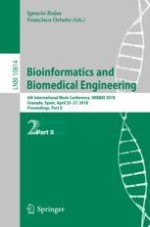2018 | OriginalPaper | Buchkapitel
Comparison of Different Sampling Algorithms for Phenotype Prediction
verfasst von : Ana Cernea, Juan Luis Fernández-Martínez, Enrique J. deAndrés-Galiana, Francisco Javier Fernández-Ovies, Zulima Fernández-Muñiz, Óscar Alvarez-Machancoses, Leorey Saligan, Stephen T. Sonis
Erschienen in: Bioinformatics and Biomedical Engineering
Aktivieren Sie unsere intelligente Suche, um passende Fachinhalte oder Patente zu finden.
Wählen Sie Textabschnitte aus um mit Künstlicher Intelligenz passenden Patente zu finden. powered by
Markieren Sie Textabschnitte, um KI-gestützt weitere passende Inhalte zu finden. powered by
